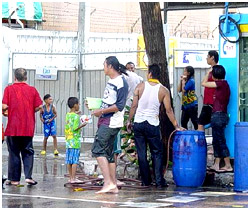Originally, the date of Songkran was calculated on the basis of astrological observations, but now it remains fixed and falls on the same date every year, thereby coinciding with traditional New Year celebrations of many countries of South and Southeast Asia. Across Thailand, Songkran is regarded as a time to honor tradition, community and family. Therefore, people uphold family values by washing hands of elders, with scented water. Children smear
 perfumed water on to the
hands of parents and grandparents and bestow them with gifts in order to
show their respect. Elders of the household also shower youngsters with
good luck and generous blessings.
perfumed water on to the
hands of parents and grandparents and bestow them with gifts in order to
show their respect. Elders of the household also shower youngsters with
good luck and generous blessings.Rural folks who work in cities make a visit to their homes to spend time with their families. Many people also call on neighbors and friends and enjoy various proceedings of carousing. Apart from reveling with friends and family, another notable feature of Songkran is the act of throwing water. People douse each other with water infused with fragrant herbs, as water is considered to cleanse bad deeds or 'Karma'. Streets remain filled with rovers, armed with water containers and water guns, waiting to flood every passerby. Moreover, the Buddha image 'Buddhasihing' housed in the National Museum is brought out. People toss water at the holy image and seek Buddha's blessings.
During the celebration, many people also make it a point to visit a Wat (Buddhist monastery) in order to pray and give alms to monks. Moreover, in order to attain good luck and prosperity, people bathe the Buddha images in these monasteries, with sanctified water soused with fragrant herbs. In addition, people also ritually bathe household Buddha images. Thai people go on a painstaking housecleaning spree and discard all the old and useless domestic items, which they believe invite bad luck. Thus, Songkran, with its religious importance, domestic significance and drenching water battles, remains one of the most popular festivals of Bangkok.



